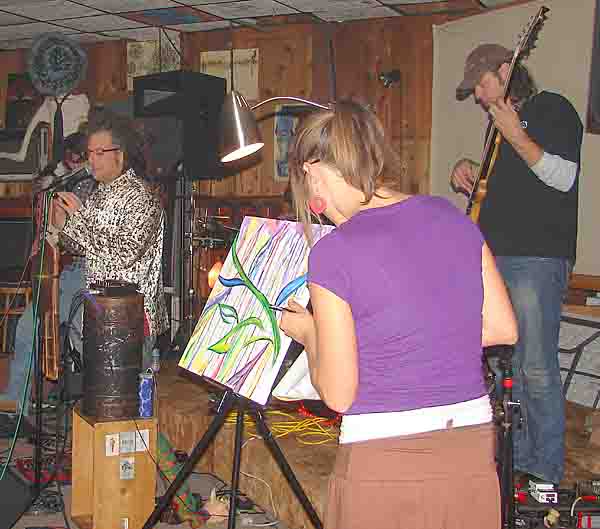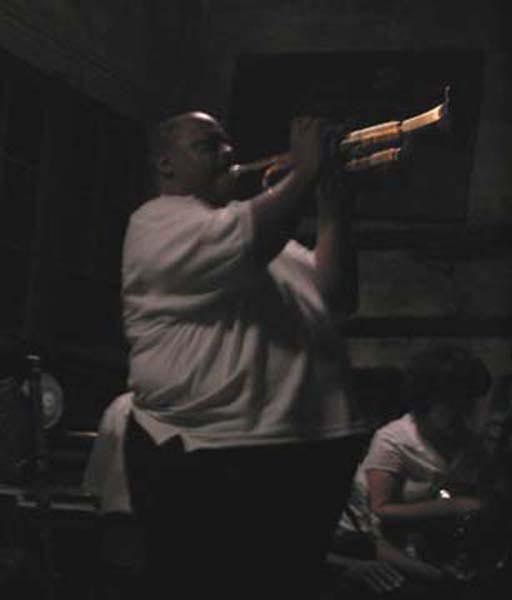|
Dusty Dog Reviews The whole project is hip, anti-academic, the poetry of reluctant grown-ups, picking noses in church. An enjoyable romp! Though also serious. |
|
Nick DiSpoldo, Small Press Review (on Children, Churches and Daddies, April 1997) Children, Churches and Daddies is eclectic, alive and is as contemporary as tomorrow’s news. |



|
Kenneth DiMaggio (on cc&d, April 2011) CC&D continues to have an edge with intelligence. It seems like a lot of poetry and small press publications are getting more conservative or just playing it too academically safe. Once in awhile I come across a self-advertized journal on the edge, but the problem is that some of the work just tries to shock you for the hell of it, and only ends up embarrassing you the reader. CC&D has a nice balance; [the] publication takes risks, but can thankfully take them without the juvenile attempt to shock. |
|
from Mike Brennan 12/07/11 I think you are one of the leaders in the indie presses right now and congrats on your dark greatness. |
Volume 244, July/August 2013
Internet ISSN 1555-1555, print ISSN 1068-5154

see what’s in this issue...
Note that in the print edition of cc&d magazine, all artwork within the pages of the book appear in black and white.
|
Order this issue from our printer as a paperback book (5.5" x 8.5") perfect-bound w/ b&w pages |

|
poetry the passionate stuff |
1982, under the “GOOD FOOD” signCEE
I didn’t judge you by your skin color
|
Eagles
CEE |
I try to shoot myselfFritz Hamilton
I try to shoot myself/ I
tongue gets full of buckshot &
email is blocked by rabble/ I
the top of Ernest’s head too
for pillow talk, but
looks like kechup pours like blood in !
|
Most people are full of shitFritz Hamilton
Most people are full of shit/ I
piles of absolute lies to gentle falsies to
hitting them out like never before as his
maintaining his manhood is bested in the
my spoon keeps pulling it out until I’m
the spoon sticks in my bowels & breaks, & !
|
Hundreds of souls flyFritz Hamilton
Hundreds of souls fly
them than anywhere else in
nother accomplishment of
America’s
poured out as monsters, &
murder & house our collective
bless America & her graveyard !
|
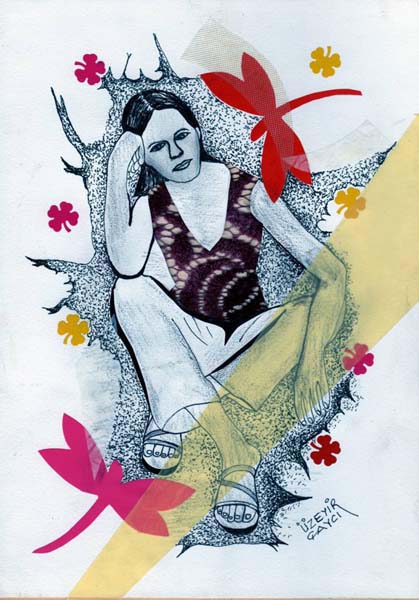
MOTIF297 KUCUK, art by Üzeyir Lokman ÇAYCI
I Walked BehindDana Stamps, II
Both my dad, and my step-
One odd time, I thought, “He is my Dad,
I asked my Mom
I was too young to question
|
| Janet Kuypers reads the Dana Stamps II poem I Walked Behind from cc&d mag, v244 (the July/August 2013 issue) |

See YouTube video of Janet Kuypers reading the Dana Stamps II poem I Walked Behind in cc&d mag, v244 (the July/August 2013 issue) live 9/25/13 in Chicago at her the Café Gallery poetry open mic (S) |
No SmokeOz Hardwick
Fire can’t be trusted, its dark heart
|
| Janet Kuypers reads the Oz Hardwick poem No Smoke from cc&d mag, v244 |

See YouTube video of Janet Kuypers reading this Oz Hardwick poem No Smoke in cc&d mag, v244 live 8/14/13 at the open mic the Café Gallery in Chicago |
Chocolate Covered Cherry DietDan Fitzgerald
I gave up listening
|
Some Feelings Never Go AwayDevon Sova
It’s that kind of hysteria
|
| Janet Kuypers reads the Devon Sova poem Some Feelings Never Go Away from cc&d mag, v244 |

See YouTube video of Janet Kuypers reading this Devon Sova poem Some Feelings Never Go Away in cc&d mag, v244 live 8/14/13 at the open mic the Café Gallery in Chicago |

the Thin Person Inside, art by Edward Michael O’Durr Supranowicz
Say goodnight Eloise!MCD
Dear Abby,
|
For Russia’s Punk Group, “Pussy Riot”*I.B. Rad
As heretic church and state * Written after watching the 2013 documentary, “Pussy Riot - A Punk Prayer”.
|

Fool 1, art byDavid Michael Jackson
UnshellingRichard King Perkins II
Broken shells seem more like empty graves
He stumbles through wild forests
It is November, filled with somber day
The doctors, with their hammers and chisels,
He’ll have a season to dream his only dream—
|
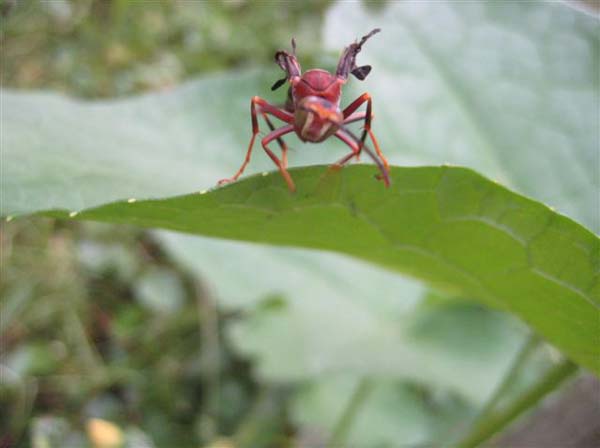
Hello, photo by Rose E. Grier
When a Young Therapist Gushes Guilt
Mel Waldman |
BIOMel Waldman, Ph. D.Dr. Mel Waldman is a licensed New York State psychologist and a candidate in Psychoanalysis at the Center for Modern Psychoanalytic Studies (CMPS). He is also a poet, writer, artist, and singer/songwriter. After 9/11, he wrote 4 songs, including “Our Song,” which addresses the tragedy. His stories have appeared in numerous literary reviews and commercial magazines including HAPPY, SWEET ANNIE PRESS, CHILDREN, CHURCHES AND DADDIES and DOWN IN THE DIRT (SCARS PUBLICATIONS), NEW THOUGHT JOURNAL, THE BROOKLYN LITERARY REVIEW, HARDBOILED, HARDBOILED DETECTIVE, DETECTIVE STORY MAGAZINE, ESPIONAGE, and THE SAINT. He is a past winner of the literary GRADIVA AWARD in Psychoanalysis and was nominated for a PUSHCART PRIZE in literature. Periodically, he has given poetry and prose readings and has appeared on national T.V. and cable T.V. He is a member of Mystery Writers of America, Private Eye Writers of America, American Mensa, Ltd., and the American Psychological Association. He is currently working on a mystery novel inspired by Freud’s case studies. Who Killed the Heartbreak Kid?, a mystery novel, was published by iUniverse in February 2006. It can be purchased at www.iuniverse.com/bookstore/, www.bn.com, at /www.amazon.com, and other online bookstores or through local bookstores. Recently, some of his poems have appeared online in THE JERUSALEM POST. Dark Soul of the Millennium, a collection of plays and poetry, was published by World Audience, Inc. in January 2007. It can be purchased at www.worldaudience.org, www.bn.com, at /www.amazon.com, and other online bookstores or through local bookstores. A 7-volume short story collection was published by World Audience, Inc. in June 2007 and can also be purchased online at the above-mentioned sites. |
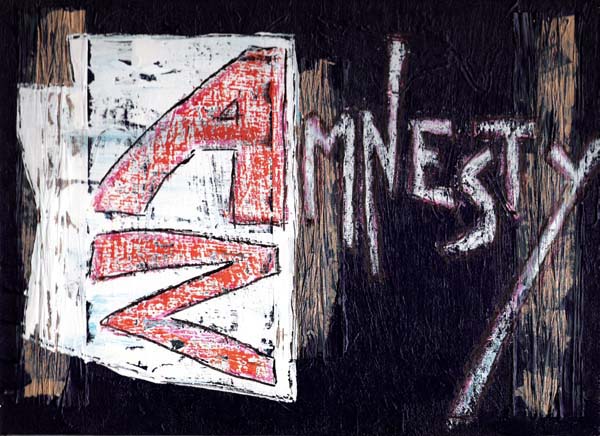
Bring Us Your Boycott, painting by Aaron Wilder
Entertainment |
In Refusing to Rise,
Kenneth DiMaggio |
On What Constitutes a SportMichael Ceraolo
Many activities are called sports
One.
Two.
Three. Let the debate begin
|

Pro tennis: former Illini team member Dennis Nevolo serving during a pro tennis match 7/2/12, photos by John Yotko
Vernon Eugene at the Civil War RoundtableWilliam Robison
Vernon Eugene almost gets his ass whipped
lips dripping blood from sixteen-ounce T-bones
laughs his stringy-haired skinny self silly
or ‘Bobby Lee and the wee drummer boy:
khaki-vest bald-head red-faced Collins
Esther falls down in a dead faint, ‘Oh, my
tiptoe dancing the hallway, he offers
cackling ‘Blow me, said the gay cannoneer’
|
William Robison BioWilliam Robison teaches history at Southeastern Louisiana University and has published considerable nonfiction on early modern England, his most recent work being The Tudors in Film and Television (McFarland, 2012), co-authored with Sue Parrill. For more info, see http://www.tudorsonfilm.com. He is also a musician and a maker of short films, both which the curious can check out at http://www.myspace.com/562067730. Poetry is a newer form of expression for Robison, but recently hwe has had poems accepted by Amethyst Arsenic, amphibi.us, Anemone Sidecar, Apollo’s Lyre, Asinine Poetry, Carcinogenic Poetry, decomP magazinE, Forge, Mayday Magazine, On Spec, and Paddlefish.
|

|
Chicago Pulse “sweet poems, Chicago ” |
Mostly about a ColorJenene Ravesloot
Two yards of thin blue silk—a woman
|
| Jenene Ravesloot reads ther poem Mostly About a Color from cc&d mag, v244 |

See YouTube video of Janet Kuypers reading this Oz Hardwick poem No Smoke in cc&d mag, v244 live 8/14/13 at the open mic the Café Gallery in Chicago |
IsolationPepper Giese
I’m just a kid in cut out clothes
|
| Janet Kuypers reads the Pepper Giese poem Isolation from cc&d mag, v244 (the July/August 2013 issue) |

See YouTube video of Janet Kuypers reading the Pepper Giese poem Isolation in cc&d mag, v244 (the July/August 2013 issue) live 9/25/13 in Chicago at her the Café Gallery poetry open mic (S) |
less hi more kuBruce Matteson
a wise man tells his daughter
|
| Janet Kuypers reads the Bruce Matteson poem Less Hi More Ku from cc&d mag, v244 |

See YouTube video of Janet Kuypers reading this Bruce Matteson poem Less Hi More Ku in cc&d mag, v244 live 8/14/13 at the open mic the Café Gallery in Chicago |
city veinWill C. Superior
my soul is scattered all over this city my soul is a part of this city
|
Chicago “L”Josh Gaines
The skyscraper scaffolding
The little brown boys
The toll bridges
Windows reflect windows
Brick walls close as an eyelash
|

|
Dreams 12/3/12Janet Kuypers12/3/12
So I was in the cul-de-sac on my street,
Looking back, why did I have
Either way, I walked to a neighbor’s house,
I don’t know,
|

See YouTube video of Kuypers reading this poem 1/30/13 at the Café Gallery in Chicago (from the Canon camera) | |||||||||||||||||||||||||||||||||||||||

See YouTube video of Kuypers reading this poem 1/30/13 at the Café Gallery in Chicago (from the Sony camera) |

See YouTube video of Kuypers reading the poems Dreams 12/3/12 and Garret’s Lament 1/30/13 at the Café Gallery in Chicago (from the Sony camera) |

See YouTube video of Kuypers hosting the open mic 1/30/13 at Gallery Cabaret’s the Café Gallery in Chicago, plus her reading poetry (including this poem) |

See YouTube video of Bob Rashkow reading this Janet Kuypers poem Dreams 12/3/12 in cc&d mag, v244 live 9/18/13 at the open mic the Café Gallery in Chicago (C) |

See YouTube video of Bob Rashkow reading this Janet Kuypers poem Dreams 12/3/12 in cc&d mag, v244 live 9/18/13 at the open mic the Café Gallery in Chicago (S) |
Dreams 12/6/12Janet Kuypers12/6/12
I was in my house,
And this really surprised me,
But I didn’t realize that he just
|
| Janet Kuypers reads her poem Dreams 12/6/12 from cc&d mag, v244 (the July/August 2013 issue) |
| Rather read it? Then read the poem Dreams 12/6/12 |

See YouTube video of Janet Kuypers reading her poem Dreams 12/6/12 from cc&d mag, v244 (the July/August 2013 issue) live 9/25/13 at the open mic the Café Gallery in Chicago (S) |

See YouTube video of Janet Kuypers reading her poem Dreams 12/6/12 from cc&d mag, v244 (the July/August 2013 issue) live 9/25/13 at the open mic the Café Gallery in Chicago (S, with the Film Age - Older fli==ilter) |
Lost my BreathJanet Kuyperstwitter-length poem 1/11/13
I looked at you
I it was just
that
|
Etched into that TombstoneJanet Kuypersstarted 10Ὧ24Ὧ12, completed 10Ὧ25Ὧ12 I’ve seen my tombstone
and the date etched in that stone
and you say I saved you
I know you cannot answer,
and what, now I am here,
I had no one to save me
how can I save you ###
was it music
because it brings me to tears what, because of science
science is what I rely on with this hole
with this tombstone, ###
yes, you’ve made me feel less alone
but like a Black Hole until nothing can escape ###
I know, I know
maybe I should know
and I saw that date so I just have to remember: all this joy and more importantly, all this pain
this is all
|
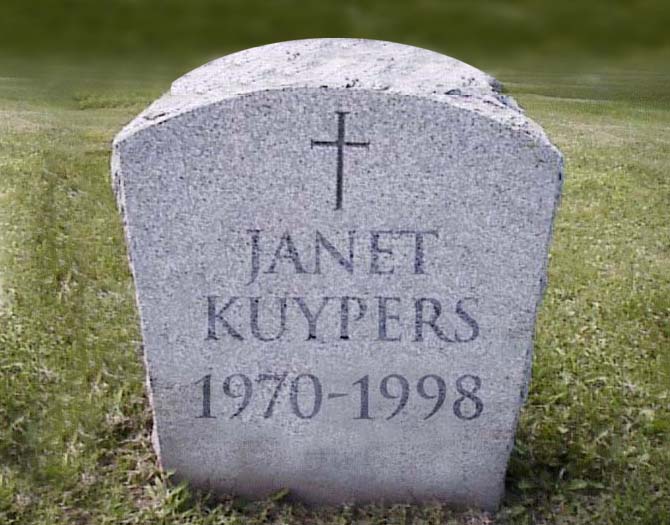
You Can’t TellJanet Kuypers3/1/13, twitter-length poem
Jerry said that his brother said
|
Garret’s LamentJanet Kuypers12/28/12
I know I truly belong to her.
I know she cannot come to me,
I know Bartholomew stands guard
I know it’s sad, that I cannot be
If you happen to see me,
|
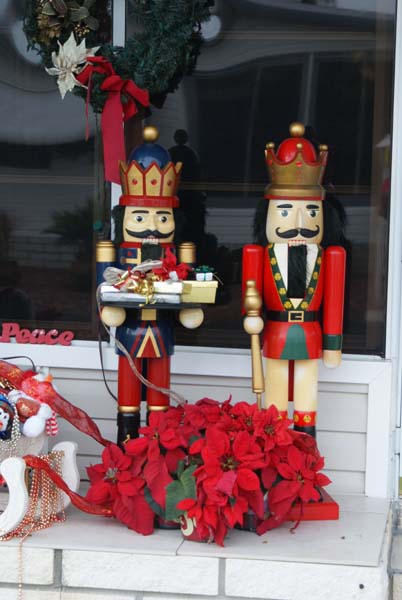
Janet Kuypers Bio
Janet Kuypers has a Communications degree in News/Editorial Journalism (starting in computer science engineering studies) from the UIUC. She had the equivalent of a minor in photography and specialized in creative writing. A portrait photographer for years in the early 1990s, she was also an acquaintance rape workshop facilitator, and she started her publishing career as an editor of two literary magazines. Later she was an art director, webmaster and photographer for a few magazines for a publishing company in Chicago, and this Journalism major was even the final featured poetry performer of 15 poets with a 10 minute feature at the 2006 Society of Professional Journalism Expo’s Chicago Poetry Showcase. This certified minister was even the officiant of a wedding in 2006. |

|
prose the meat and potatoes stuff |
CirclesEric Burbridge
The dealer’s hand passed over the chips and numbers signaling all bets final while the ball descended from its journey around the roulette wheel as onlookers held their breath. Uncle Mario’s eyes followed it past the colored and numbered notches that held the players dreams and fantasies. The back of his motorized chair lifted him further to see that pearly pebble land on — 24 black. He pushed the lines from the portable oxygen tank aside and collected half his winnings and placed the others on the adjacent number. His health had deteriorated over the past month, so the request to go to the casino, though inconvenient, was understandable. He smiled while sweat trickled down through the wrinkles that intersected at the bottom of his face before falling into the handkerchief I dabbed on his chin. “Remember Circles, Amos?” He asked with a trembling voice.
|
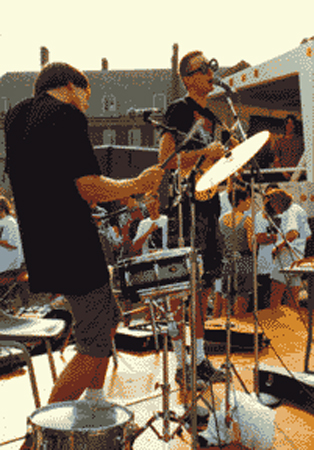
EncoreWendy C. Williford
You are the heavens, you are the earth; you are their god and the breath in their lungs. You hold infinite power in your hands. And you would give it up in a heartbeat for a decent night’s rest.
“Still, it’s time he played it right. This encore has to be perfect.” Mal takes too much upon himself. He’s spent years in this business, negotiating deals, getting you everything you’ve ever wanted, playing mother hen to you and the rest of the band. He’s a good friend, a rarity, but even he doesn’t have a clue as to the change that’s been coming over you. You’re not sure you know it yourself. Jago. Jago. Jago. The chanting is relentless. You know you’ll keep hearing it long after you leave tonight, when your head finally hits the pillow, alone, in whatever hotel they’ve put you. You’ll close your eyes and still see the multitude of multi-thousands in a sea as far as your eyes can see – your sea of tranquility. The sea is the same, no matter where you go. Christ, where are you anyway? Cleveland? Detroit? Houston? Are you sure you’re even in America? You remember getting on the plane last night. For the life of you, you can’t remember where it landed. “Right.” Mal stands and grunts, stretches his arms out as if he’s exhausted and walks away. “I need a piss.” He passes the craft table again, grabs another bottle, looks around the room and adjusts the straining waistband of his pants. “Okay, boys, you have five minutes before encore.” You finally look at your reflection in the mirror. So much has changed, so many things have gone away and you don’t know where. Your long, dark hair is thinning a little on top, the bags under your eyes are so heavy you wonder how any woman in the world can still find you attractive. If you didn’t keep up with your regimen of weights on the bus, no telling how out of shape you’d really be. You look down at your stomach and notice with odd amusement a few gray hairs surrounding your belly button. Oh yeah, that’s sexy all right. “Hey.” You turn around in your chair, catching Mal before he hits the door. “Did you check with will call? Did she get the tickets? Is she here tonight?” Mal gives you that dreaded look. He bites his lip and shakes his head. “Sorry, mate.” You nod and he walks out the door. Looking back at the mirror, you stare at yourself until your drying eyes fade into the haze surrounding you. ?It was all so simple in the beginning, when music was an exciting mystery. It didn’t take much to draw you in, to capture you, to make itself your first mistress. Who knew that young man from Memphis could draw you in as he did. You watched with fascination as you laid in front of the television, your Tonka trucks displayed in front of you and a small, black metal T-Bird still in your hand. Something changed in you. By the time the Liverpool boys came on the scene you fully understood your life’s calling. And when Dylan went electric, it burned in your soul and you stopped at nothing to become the best. You learned to play by watching the best at every opportunity, whether watching the fingers of each guitarist or studying their sound until your subconscious thought in notes. You learned to touch and handle a guitar long before you discovered how to touch a woman, making it sing, breathe, and moan with ease. It came alive under your fingertips and entered your blood. Others recognized it, too. You played every shitty club that would accept you, giving small samples of your gift until the right person came along who would undeniably understand your talent. His promises came a little at a time – first more gigs, second women, third drugs, until there was nothing left to offer but the record contract. But it came at a price, didn’t it? You could have fought harder on the name change, but something about Jago sounded heavier, deeper, more mysterious, more dangerous, more British, less Jewish. From that moment on, you were lost in a world that promised everything, would drain you of your last breath and turn away if you fell. You were at the beginning of a burnout when she came on the scene. And immediately you could feel the breath enter your lungs again. It was simple fate, that day on the crosswalk of Abbey Road when she first walked by. Something about her eyes caught your attention. She smiled gently, her auburn hair catching the breeze, a lonesome lock falling gently over her shoulder, inviting you to take in the sexiness of her neck framed delicately in an unbuttoned white silk collar. In your head, you named her Lovely Rita, committed her smile to memory and thought about it for days. Truly, fate was on your side when you found her again at the Tower of London, shuffling a throng of children past the Crown Jewels, her eyes sparkling as brightly as the finely embedded gems of the coronation crown behind her thin-frame glasses. Her hair was tied in a long braid, hanging over her shoulder, inviting you once again to take in the beauty of her neck, making you wonder what she smelled like. The surrounding children stared at her in wonder as she whispered the history of the jewels to them, and you hung on to every word she said, imagining what her whisper would sound like against your ear. Finally, taking a deep breath and running your fingers through your hair, you worked up the nerve to approach her. All you wanted was her name. 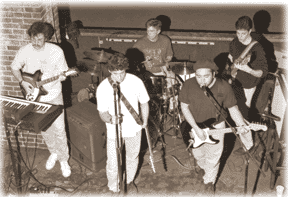 “Have you ever wanted to be immortalized in song?” you said to her, realizing immediately it sounded better in your head.
“Have you ever wanted to be immortalized in song?” you said to her, realizing immediately it sounded better in your head. She looked at your ponytail, your leather jacket and boots, and gripped the hands of her students standing by. “I take it you’re a musician?” Captivated by her neck again, you saw the nervous lump form in her throat. “That’s right, love.” You could tell she was trying to let you down easy. She wouldn’t even give you the honor of her smile again. “I’m really more of a symphony girl. Sorry.” Then she walked away. It almost knocked the wind out of you. You couldn’t back down, not without a fight. “Did you ever stop to think that symphony orchestras are nothing but cover bands for the elite?” She stopped, turned back to you and stared, her light eyes sparkling as she worked out the epiphany in her head. Finally, that beautiful smile spread across her lips. You knew you had her and you promised then you wouldn’t let her go. Mara. Mara. Mara. It was simple in the beginning. Natural. You played and teased each other with nothing but your eyes, both too shy to go too far. The past had been filled with countless, nameless women, women who served their purpose, gave you what you needed while giving them what they wanted. You never had a single regret when you walked away. But Mara was different. It took all your courage just to hold her hand. And when that first night came, the night she invited you to stay at her flat, awake with each other until the dawn, she held you tight, breathing your name against your ear, her arms caressing your shoulders, fingers running through your hair, her legs still wrapped around you. You were safe in her cocoon – unafraid, no longer holding uncertainties, no longer searching for something you never knew you needed. She entered your world with ease. The invitations, the parties, the all-nighters proved she could handle whatever came her way. She was so damn smart, so damn sophisticated. She became more than a girlfriend. She opened to you a different world you’d never imagined conquering alone. When the record label got nervous, she put them at ease; when the venue managers tried to take higher percentages, she negotiated breakthroughs. When you and the guys argued over chords, melodies, and lyrics, she kept her mouth shut. When the tracks first appeared on her arms, you pretended not to notice. It wasn’t a big deal when it first started. Everybody experiments in some way. Hell, you had done it a time or two, but never went through that ever-rumored need it would take over. Your constitution and will were stronger than that. So why didn’t she possess that same strength? Why couldn’t you have been strong enough for both? A year has passed since you both hit bottom. It was noon, and you were still passed out when the phone relentlessly began to ring. Rushing to the hospital, you considered it luck the new tour hadn’t started. After dealing with the doctor’s questions, you found Mara lying on the bed, staring out the window, half asleep. The darkness under her eyes was barely discernible from the redness and vacancy they contained. Sitting beside her, gripping her frail hand, your eyes trailed up to the fresh marks and tried not to think about your son’s tiny body, deprived of his first breath. When she noticed you, the smile spread across her lips again, a pale comparison of what it used to be, her darkened teeth incapable of the brilliancy they once held. “Do you still want to immortalize me in song?” You hid your eyes, refusing to let her see the disappointment, the shame you felt knowing you were more responsible than she. “It’s no big deal,” she said, drifting out. You kept your eyes on the I.V. drip, unable to find the strength to look at her. “We can always try again.” But you knew better. From that moment you understood there was no trying again. God only gave these chances once in life and you had both blown it. Tears would have been easy to explain, but pulling your hand away from her desperate grip, getting up, and walking out the door was not. The fear returned. You ran across the planet and you couldn’t get away from it, couldn’t shake it, couldn’t loosen its stranglehold. You searched every corner to find some semblance of her, testing your sobriety every night, searching in unknown eyes, between unknown legs, for someone that reminded you of her and the way she was, the way she used to be before you entered her life. It’s only been in the last two months that you’ve heard she’s finally cleaned up, gotten her life back on track. She’s teaching again – this time to addicted teens. You can find yourself taking a moment from your own pity and despair to smile, your heart filled with relief that she’s still alive, and living again – living without you. In the same moment, despair returns when you realize you can never go back to her as you are, not as a star, not as Jago. You have to give it up. Wholeheartedly. It can’t be done, can it? There is no walking away, no matter what the rumors claim. Perhaps it’s the reason you think the greats had it easy, dying at early ages, forever young in the eyes of their fans despite the fact their deaths carried so many indignities: heart-attack in the bath, gun to the head, bottle in the hand, pills in the mouth, needle in the arm, choking on vomit, slouched over a toilet. Where would you be buried? What dark memorial stone would they erect for you? How long would it take before somebody claimed they saw you at Burger King? A peal of laughter fills the room, dragging you out of your stupor. The blonde on Lee’s leg slaps him across the shoulder and continues to laugh. You take the final drag from the cigarette and put it out in the ashtray. You settle back again and give yourself one last chance to get her out of your mind. The photographer approaches and takes your picture. You don’t smile, you don’t acknowledge him. He captures you the way you want to be remembered, sitting comfortably in a dark, leather dressing chair, the lights around the mirror casting a warm glow over you, your eyes lost in your reflection, sweat covering your body, your hair damp from the energies of the show, your elbow on the armrest, your forefinger against your mouth, lost in thought. It will be beautiful if it’s in black and white. Jago. Jago. Jago. The chanting returns when Mal pushes open the door. This time he’s carrying a bunch of roses. An amused expression covers his face and a faint streak of red lipstick is smeared against his chin.
You lean forward, count the roses and settle back. “Fourteen’s an odd number.” “Can you guess what she did if I promised to deliver them to you personally?” Mal laughs and wipes the lipstick off his chin with the back of his hand. He’s being a complete prick right now. There’s an old saying in the business, if you can’t be a rock star, at least be on the road crew. The money’s not the same, but the chicks are free. Mal takes a long, hard look at you. You’re not being as fun as he’s used to. “What the fuck’s wrong with you tonight? You’ve been in this mood ever since we left Phoenix.” You take in a short breath, relieved you’re in the United States. You’re not so lost after all. Mal kicks the chair. “Seriously, Jay, what’s the matter?” “I’ve a lot on my mind.” “What? Mara?” He shakes his head, and rolls his eyes. “Again with this, you’re fucking losing your mind, mate.” You shrug. It’s pointless explaining anything to Mal. He tries to be understanding, often chucks it up to your artistic temperament, but he’ll never understand the fracture Mara left in your soul. “I have to know.” “Know what? If she’s passing out every night with a needle in her arm, if she’s blowing some bloke in the back of a pub for a fix?” The look you shoot him shuts him up. “She’s not doing it anymore.” “Right. A leopard and its spots, eh? What makes you certain?” You feel yourself giving in, unable to give a logical answer. You want to close your eyes, fall asleep, and block out the entire world until you’re able to find her, find her smile, rediscover the joy you gave each other until you wake up in her arms again and realize it was nothing but a bad dream. “I’m not. But it wouldn’t take much to find out.” Mal shakes his head and smirks. He’s hating this conversation. He breathes out deeply, takes out another cigarette and lights it. “Whatever.” He exhales his latest drag. In the mirror, you see the white cloud hanging ominously above you. It’s fitting. “You’ve got twenty-two more dates on this tour. After it’s over, do what you need to. But right now, you’ve got one minute to get back on that stage. There are over fifty thousand fans out there waiting.” Mal’s little tantrum amuses you. “What do you think they’ll put on my tombstone?” It gets the reaction you’re hoping for. Mal grabs his knee and lowers himself until he’s looking you in the eye. “Here lies Jago Brix, a brilliant bastard who lost it over a woman. What the fuck are you talking about?” You close your eyes and take in a deep breath. It’s the only thing that gives you the slightest tranquility these days. “I think I’m through.” “What are you on about?” You rise from your chair and throw the towel to the ground. You smile at him, the same smile that makes the women wild, cup your hand around Mal’s neck, shake his hand and whisper, “Hey, man, it’s an encore.” You want to laugh out loud and prove to everyone that maybe you’ve lost it after all. But maybe it’s better to take it one step at a time. You spread out your arms, wide enough to hold the entire world; you look at everyone in the room as you take backwards steps towards the door. You catch their confusion, their inability to understand your actions and the new madness that’s overcome you. Mal’s announcement that it’s time to head back to the stage hasn’t been made. It’s what they’ve been waiting for. “Goodnight, my beauties. You’ve been a lovely audience.” You take a bow, whip back up and salute them, an action they’ve seen you do every night since the band came together. Only this time, you’re doing it to them. You effortlessly pivot on your heels and head toward the door. You grab a t-shirt from the box and throw open the door, already breathing easier. Right before the door shuts, you hear Mal shout, “What the holy fuck?” The door slams, echoing down the corridor. The chanting continues, as loud as it was before. The voices are thick with desperation. They’re having doubts, you can sense it. They’re beginning to realize you might not come back. You don’t want to revel in it, but something about it feels good. It just feels right. The stage is to the left, the rest of the world is to the right. You’re really not sure what to do. You only have a few bucks in your pocket, but you only need a few for a phone call anyway. If you’re lucky, she’ll answer. If you’re luckier, she’ll forgive you. It’s a chance you’re willing to take. Either way, with a clearer conscience, you’ll finally get a good night’s sleep.
|
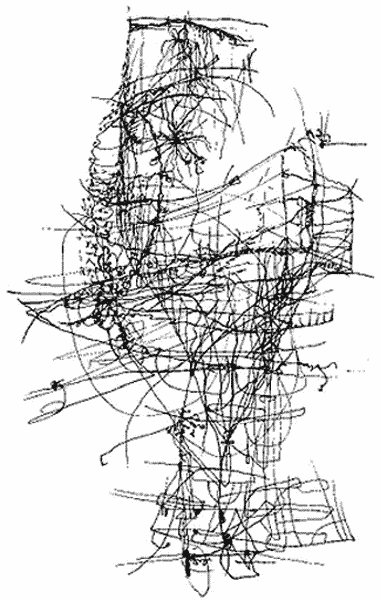
Construct, drawing by the HA!Man of South Africa
|
(title removed from online listing on author’s request) Joshua Copeland 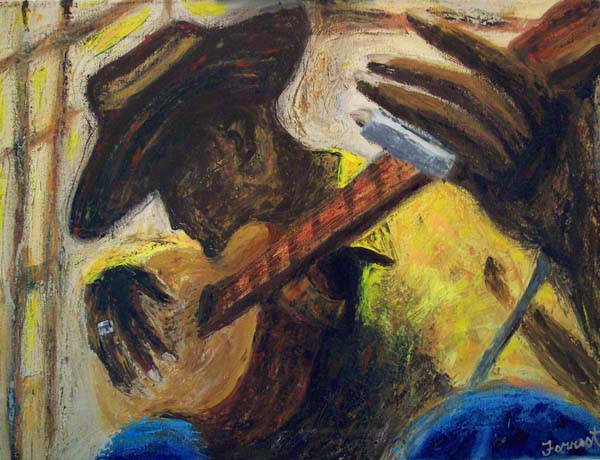 Blues Man, art by Brian Forrest
I looked down the street. For blocks, it was utter chaos. College students out for a night of drinking on the weekends always packed these streets. Now they were diving for cover. The males dove on the females. I saw one guy who looked like a major jock dive on a girl he was with. She looked sorority. Everyone was out on balconies and porches for blocks down the street, and they’re all yelling, “Someone’s got a gun! Get down!” I watched students bolt between alleys or dive behind front yard bushes or duck behind parked cars. I read in the paper the next day that a panhandler down the street wielded a stick, waving it at students, yelling at them to keep away, and that someone had a gun.
|
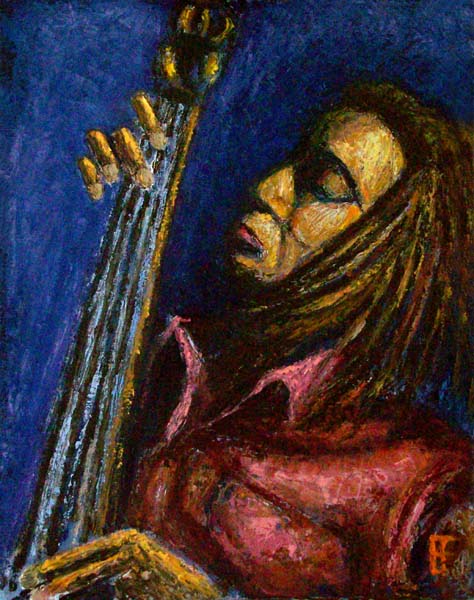
Bass Man, art by Brian Forrest
Hospital MemoriesGary Hull
In a four-bed hospital ward, sixteen-year-old Eric Casey was conscious after a few days but bed and then wheelchair-bound for nine weeks. A farm accident put him there. Cheesecloth soaked in a vinegar-smelling solution covered his thighs and shins to encourage saprophytes to consume the dead flesh. His doctor said that these bacteria did the work of maggots in cleaning wounds. The stench reminded him of decaying carcasses in the pasture.
|

Sky, art by Rex Bromfield
Mrs. HendersonMax Andrew
My 35th birthday and I’m piling into the belly of an enormous armored vehicle painted to resemble the desert. The average age of combat deaths in Iraq and Afghanistan is 26. I’m an old man here.
We’re flying home in the belly of a C-17, and I’m sitting in the middle seat of a cramped row of five chairs. My kneecaps are pushed out of place from being wedged behind the seat in front of me. When I lean my head back in the awkward seat, my right trapezius feels like it’s being impaled by an ice pick. I can’t sleep.
Driving in the cracked, leather bucket seat of the Toyota pickup my wife left me in the divorce, the Florida summer makes my back sweat through my shirt. Prickly heat in my back, ass, and legs makes the drive an eternity with a broken air conditioner. The open window only circulates stuffy, humid air as I speed down Highway 17-92.
#
Like having to walk through the deep desert mud to take a piss, I don’t want to step in the dirt. My kneecaps are pushed up into the dashboard under the steering wheel as I sit in the road outside the new kid’s house, finishing my Winston Light. But, like in the desert, you have to move eventually, no matter if it’s for a full bladder or an order from a captain. I step out of the tiny cab and crush the white filter into the asphalt.
|
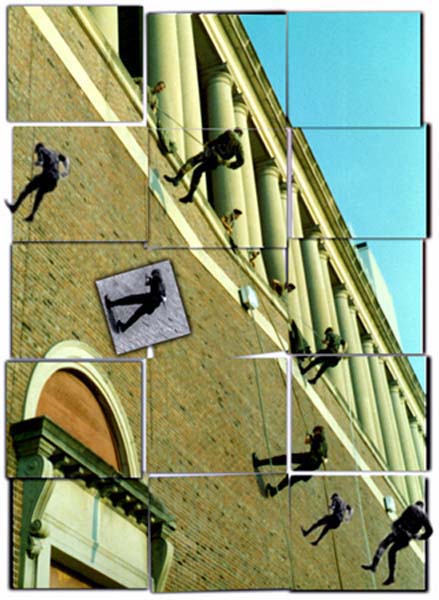

Debra Purdy Kong, writer, British Columbia, Canada I like the magazine a lot. I like the spacious lay-out and the different coloured pages and the variety of writer’s styles. Too many literary magazines read as if everyone graduated from the same course. We need to collect more voices like these and send them everywhere.
Children, Churches and Daddies. It speaks for itself. Write to Scars Publications to submit poetry, prose and artwork to Children, Churches and Daddies literary magazine, or to inquire about having your own chapbook, and maybe a few reviews like these.
what is veganism? A vegan (VEE-gun) is someone who does not consume any animal products. While vegetarians avoid flesh foods, vegans don’t consume dairy or egg products, as well as animal products in clothing and other sources. why veganism? This cruelty-free lifestyle provides many benefits, to animals, the environment and to ourselves. The meat and dairy industry abuses billions of animals. Animal agriculture takes an enormous toll on the land. Consumtion of animal products has been linked to heart disease, colon and breast cancer, osteoporosis, diabetes and a host of other conditions. so what is vegan action?
We can succeed in shifting agriculture away from factory farming, saving millions, or even billions of chickens, cows, pigs, sheep turkeys and other animals from cruelty. A vegan, cruelty-free lifestyle may be the most important step a person can take towards creatin a more just and compassionate society. Contact us for membership information, t-shirt sales or donations.
vegan action
Children, Churches and Daddies no longer distributes free contributor’s copies of issues. In order to receive issues of Children, Churches and Daddies, contact Janet Kuypers at the cc&d e-mail addres. Free electronic subscriptions are available via email. All you need to do is email ccandd@scars.tv... and ask to be added to the free cc+d electronic subscription mailing list. And you can still see issues every month at the Children, Churches and Daddies website, located at http://scars.tv
MIT Vegetarian Support Group (VSG)
functions: We also have a discussion group for all issues related to vegetarianism, which currently has about 150 members, many of whom are outside the Boston area. The group is focusing more toward outreach and evolving from what it has been in years past. We welcome new members, as well as the opportunity to inform people about the benefits of vegetarianism, to our health, the environment, animal welfare, and a variety of other issues.
Dusty Dog Reviews: These poems document a very complicated internal response to the feminine side of social existence. And as the book proceeds the poems become increasingly psychologically complex and, ultimately, fascinating and genuinely rewarding.
Dusty Dog Reviews: She opens with a poem of her own devising, which has that wintry atmosphere demonstrated in the movie version of Boris Pasternak’s Doctor Zhivago. The atmosphere of wintry white and cold, gloriously murderous cold, stark raging cold, numbing and brutalizing cold, appears almost as a character who announces to his audience, “Wisdom occurs only after a laboriously magnificent disappointment.” Alas, that our Dusty Dog for mat cannot do justice to Ms. Kuypers’ very personal layering of her poem across the page.
Fithian Press, Santa Barbara, CA Indeed, there’s a healthy balance here between wit and dark vision, romance and reality, just as there’s a good balance between words and graphics. The work shows brave self-exploration, and serves as a reminder of mortality and the fragile beauty of friendship.
Mark Blickley, writer You Have to be Published to be Appreciated. Do you want to be heard? Contact Children, Churches and Daddies about book or chapbook publishing. These reviews can be yours. Scars Publications, attention J. Kuypers. We’re only an e-mail away. Write to us.
The Center for Renewable Energy and Sustainable Technology The Solar Energy Research & Education Foundation (SEREF), a non-profit organization based in Washington, D.C., established on Earth Day 1993 the Center for Renewable Energy and Sustainable Technology (CREST) as its central project. CREST’s three principal projects are to provide: * on-site training and education workshops on the sustainable development interconnections of energy, economics and environment; * on-line distance learning/training resources on CREST’s SOLSTICE computer, available from 144 countries through email and the Internet; * on-disc training and educational resources through the use of interactive multimedia applications on CD-ROM computer discs - showcasing current achievements and future opportunities in sustainable energy development. The CREST staff also does “on the road” presentations, demonstrations, and workshops showcasing its activities and available resources. For More Information Please Contact: Deborah Anderson dja@crest.org or (202) 289-0061
Dorrance Publishing Co., Pittsburgh, PA want a review like this? contact scars about getting your own book published.
 The magazine Children Churches and Daddies is Copyright © 1993 through 2013 Scars Publications and Design. The rights of the individual pieces remain with the authors. No material may be reprinted without express permission from the author. 
Okay, nilla wafer. Listen up and listen good. How to save your life. Submit, or I’ll have to kill you.
Dorrance Publishing Co., Pittsburgh, PA: “Hope Chest in the Attic” captures the complexity of human nature and reveals startling yet profound discernments about the travesties that surge through the course of life. This collection of poetry, prose and artwork reflects sensitivity toward feminist issues concerning abuse, sexism and equality. It also probes the emotional torrent that people may experience as a reaction to the delicate topics of death, love and family. “Chain Smoking” depicts the emotional distress that afflicted a friend while he struggled to clarify his sexual ambiguity. Not only does this thought-provoking profile address the plight that homosexuals face in a homophobic society, it also characterizes the essence of friendship. “The room of the rape” is a passionate representation of the suffering rape victims experience. Vivid descriptions, rich symbolism, and candid expressions paint a shocking portrait of victory over the gripping fear that consumes the soul after a painful exploitation.
Dusty Dog Reviews (on Without You): She open with a poem of her own devising, which has that wintry atmosphere demonstrated in the movie version of Boris Pasternak’s Doctor Zhivago. The atmosphere of wintry white and cold, gloriously murderous cold, stark raging cold, numbing and brutalizing cold, appears almost as a character who announces to his audience, “Wisdom occurs only after a laboriously magnificent disappointment.” Alas, that our Dusty Dog for mat cannot do justice to Ms. Kuypers’ very personal layering of her poem across the page.
|


